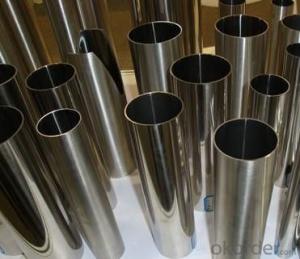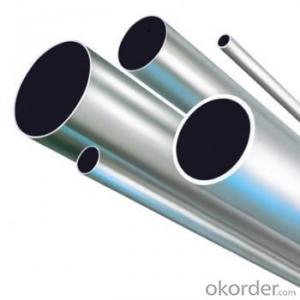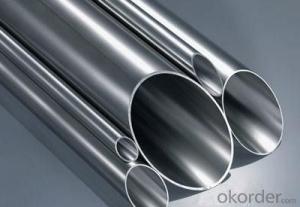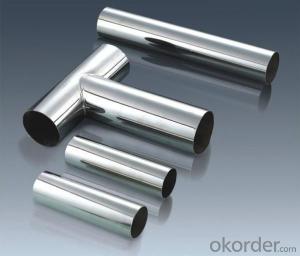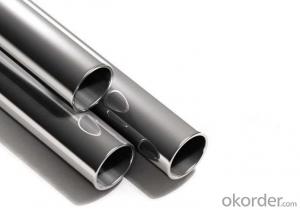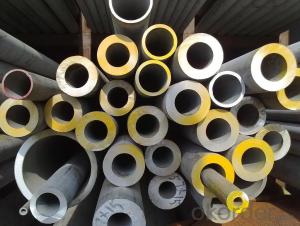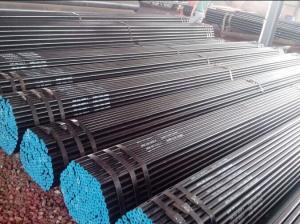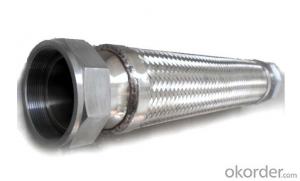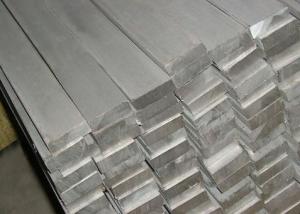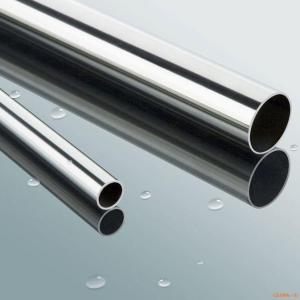201 304 2B Stainless Steel Pipes
- Loading Port:
- China main port
- Payment Terms:
- TT OR LC
- Min Order Qty:
- 5 m.t.
- Supply Capability:
- 100000 m.t./month
OKorder Service Pledge
Quality Product, Order Online Tracking, Timely Delivery
OKorder Financial Service
Credit Rating, Credit Services, Credit Purchasing
You Might Also Like
Item specifice
Standard:
AISI,JIS,GB,BS,DIN,API,EN,ASTM
Technique:
Hot Rolled,Cold Rolled,Cold Drawn,ERW,Forged,Saw,Extruded,EFW,Spring
Shape:
U Channel,Square,C Channel,Hexagonal,Round,Rectangular,Oval,LTZ
Surface Treatment:
Galvanized,Coated,Copper Coated,Color Coated,Oiled,Dry,Chromed Passivation,Polished,Bright,Black,PVDF Coated
Steel Grade:
Q195,Q215,Q235,Q215B,Q235B,RHB335,HRB400,200 Series,300 Series,400 Series,600 Series,SS400-SS490,10#,20#,A53(A,B)
Certification:
ISO,SGS,CE
Thickness:
as required
Length:
12m
Net Weight:
as required

201 304 2B Stainless Steel Pipes
Specifications
Description: 301 304 410 430 stainless steel pipes with ASTM JIN standard
Material: 200#, 240#,320#,500#,600#, etc.
Outside Diameter: 9mm~216mm
Wall thickness: 0.3 mm ~ 3.0 mm
Length: as your requirement
Application: best selling stainless steel pipes applies to petroleum, chemical industry, electric power, boiler, high temperature resistan
Technique: cold rolled
Standard: AISI, ASTM, GB, JIS
Products Show
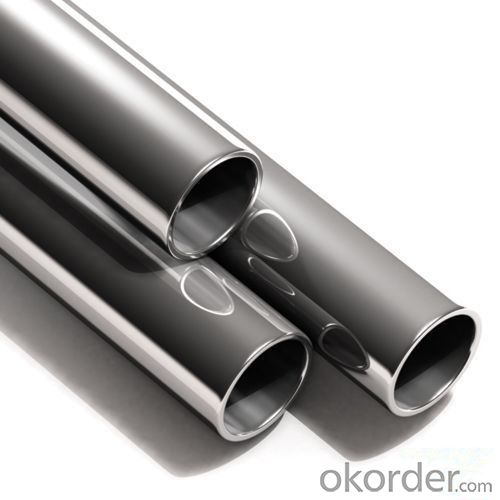
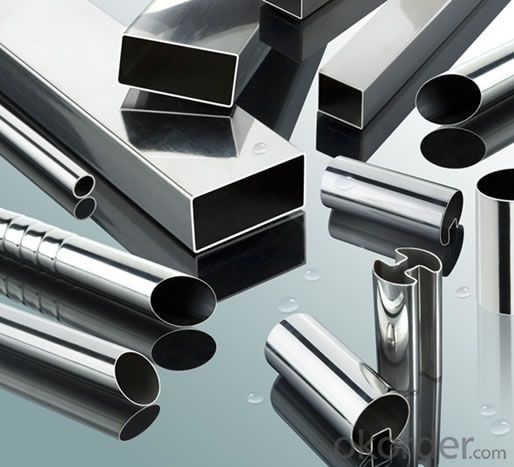
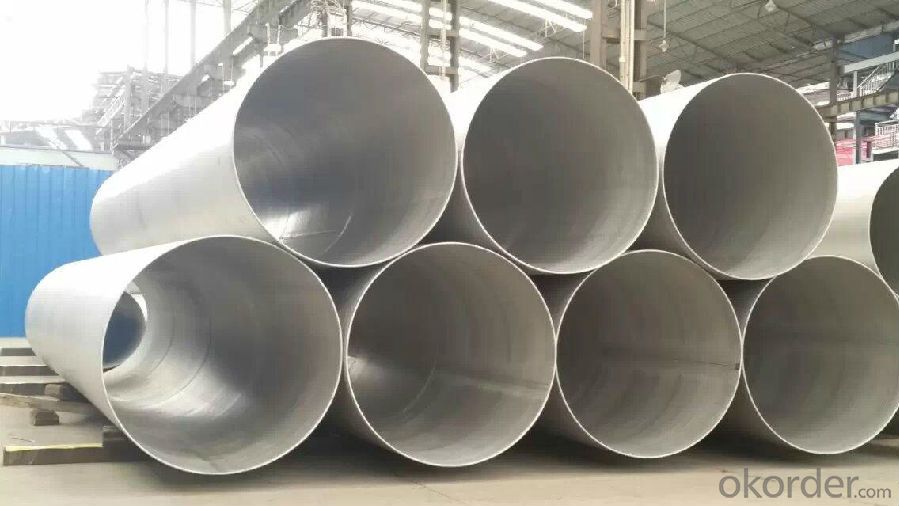
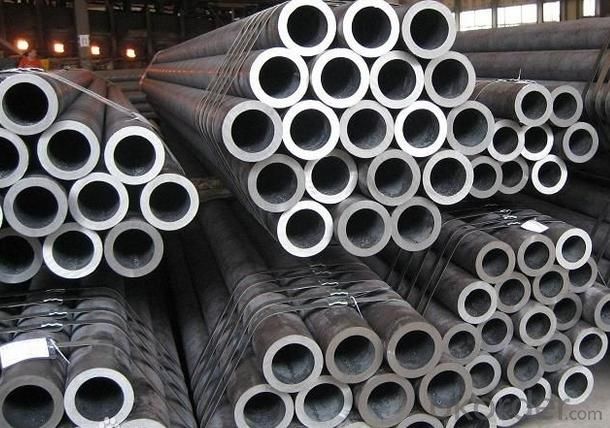
- Q:Can stainless steel pipes be used for air pollution control systems?
- Air pollution control systems can utilize stainless steel pipes because they possess several advantageous properties. Firstly, stainless steel is a remarkably sturdy and corrosion-resistant material. Consequently, it is well-suited for managing harsh environments and corrosive gases that are frequently present in air pollution control systems. Moreover, stainless steel pipes offer the benefit of being capable of enduring high temperatures, which allows for their utilization in scenarios where thermal resistance is necessary. Furthermore, stainless steel is renowned for its hygienic characteristics, rendering it an excellent selection for industries that necessitate clean and sterile air handling. Ultimately, due to their robustness, durability, resistance to corrosion, and ability to withstand high temperatures, stainless steel pipes are widely favored and dependable for air pollution control systems.
- Q:What's the difference between stainless steel decorative pipes and polished stainless steel pipes?
- Polished stainless steel pipe is different from stainless steel decorative tube, generally speaking, the material is better. Yes, the steel tube just appeared is a bit rough and not smooth enough, so it needs polishing to make it appear smooth. Mostly Austrian stainless steel, nickel, corrosion resistance, but the price is expensive, mainly for industrial and outdoor decoration.
- Q:Are stainless steel pipes fire-resistant?
- Yes, stainless steel pipes are fire-resistant. Due to their high melting point and excellent heat resistance, stainless steel pipes can withstand extreme temperatures and prevent the spread of fire, making them a reliable choice for fire protection systems.
- Q:What are the different grades of stainless steel used in pipes?
- There are several different grades of stainless steel used in pipes, including 304, 316, 321, and 409. These grades vary in their chemical composition and properties, making them suitable for different applications and environments.
- Q:Can stainless steel pipes be insulated with polyetherimide?
- Polyetherimide (PEI) is an exceptional thermoplastic that exhibits remarkable thermal stability and insulation capabilities, making it a suitable choice for insulating stainless steel pipes. With its excellent resistance to heat, chemicals, and electrical conductivity, PEI can effectively insulate stainless steel pipes in diverse industries such as oil and gas, chemical processing, and aerospace. Moreover, PEI's high glass transition temperature enables it to withstand elevated temperatures without melting or deforming, further enhancing its appropriateness for insulating stainless steel pipes.
- Q:What is the maximum temperature that stainless steel pipes can handle?
- The specific grade of stainless steel being used determines the maximum temperature that stainless steel pipes can withstand. Stainless steel pipes are generally recognized for their ability to resist high temperatures, making them suitable for various applications in industries like petrochemical, oil and gas, and power generation. The most commonly used grades of stainless steel in pipes, such as 304 and 316, have a maximum operating temperature of approximately 870°C (1600°F). These grades possess exceptional corrosion resistance and can endure high temperatures, making them appropriate for a wide range of industrial processes. Nevertheless, there are certain specialized stainless steel grades, like 310 and 321, which can handle even higher temperatures. These grades contain higher levels of chromium and nickel, offering enhanced resistance to oxidation and scaling at temperatures up to 1150°C (2100°F). It is important to consider that the maximum temperature stainless steel pipes can handle is also influenced by other factors, such as the duration of exposure, the presence of corrosive environments, and the specific requirements of the application. Therefore, it is always advisable to consult with a materials engineer or manufacturer to determine the appropriate grade and maximum temperature limits for a particular stainless steel pipe application.
- Q:Are stainless steel pipes suitable for pulp and paper industries?
- Yes, stainless steel pipes are suitable for pulp and paper industries. They are resistant to corrosion, heat, and chemicals, making them ideal for transporting corrosive and abrasive fluids commonly found in these industries. Stainless steel pipes also have high strength and durability, ensuring long-term performance in demanding environments.
- Q:What are the categories of stainless steel pipes with acid and alkali resistance?
- Stainless steel is mainly used for acid resistance, alkali resistance is not necessarily very prominent.
- Q:What brand of stainless steel pipe cutting machine is good?
- Stainless steel cutting pipe should take into account the cutting speed, accuracy, cross section flatness, surface scratches, cutting tool loss and so on
- Q:How thick is the 3 stainless steel tube?
- 3 thicknesses representing 3 mm wall thickness
1. Manufacturer Overview |
|
|---|---|
| Location | |
| Year Established | |
| Annual Output Value | |
| Main Markets | |
| Company Certifications | |
2. Manufacturer Certificates |
|
|---|---|
| a) Certification Name | |
| Range | |
| Reference | |
| Validity Period | |
3. Manufacturer Capability |
|
|---|---|
| a)Trade Capacity | |
| Nearest Port | |
| Export Percentage | |
| No.of Employees in Trade Department | |
| Language Spoken: | |
| b)Factory Information | |
| Factory Size: | |
| No. of Production Lines | |
| Contract Manufacturing | |
| Product Price Range | |
Send your message to us
201 304 2B Stainless Steel Pipes
- Loading Port:
- China main port
- Payment Terms:
- TT OR LC
- Min Order Qty:
- 5 m.t.
- Supply Capability:
- 100000 m.t./month
OKorder Service Pledge
Quality Product, Order Online Tracking, Timely Delivery
OKorder Financial Service
Credit Rating, Credit Services, Credit Purchasing
Similar products
New products
Hot products
Hot Searches
Related keywords
